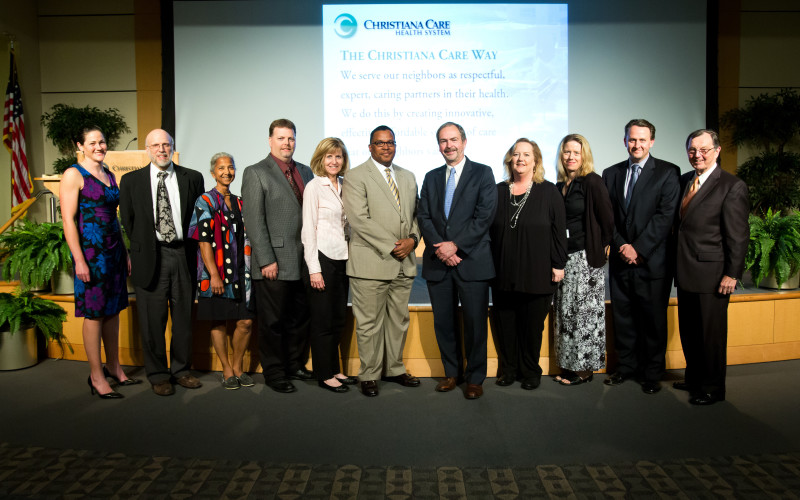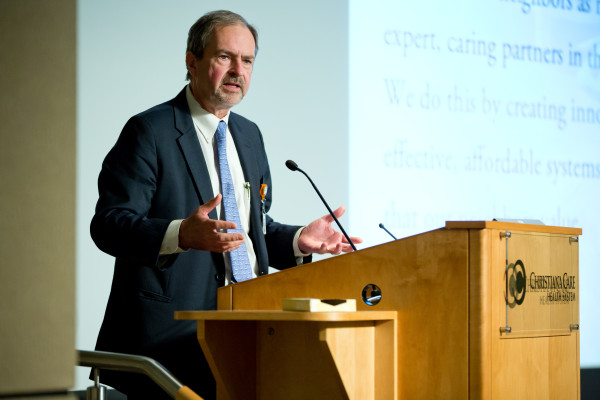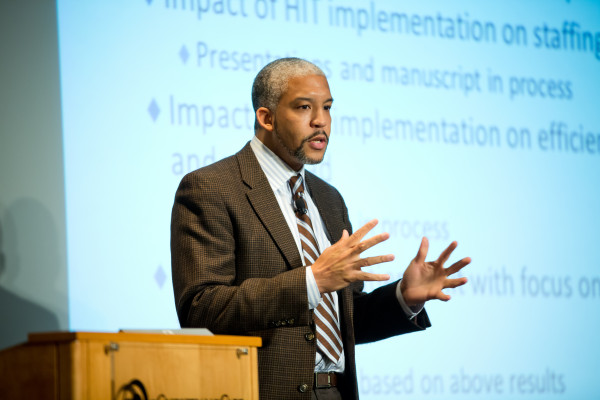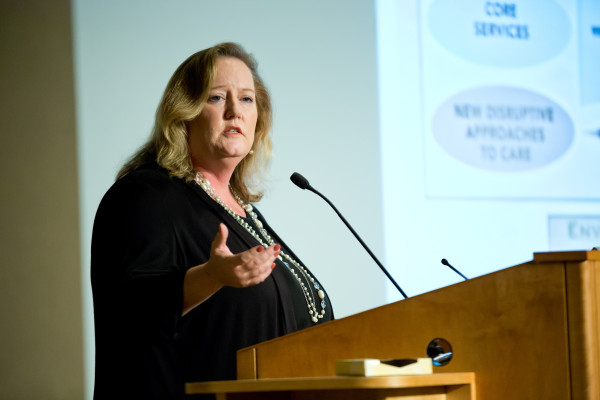Symposium spotlights Value Institute innovation, success

The word “value” is bandied about a lot in discussions of health care these days.
But what is value in health care, really? And, if you find answers to that fundamental question, how do you deliver on what you’ve learned even as you continue to drive innovative improvement?
At Christiana Care Health System, President and CEO Robert J. Laskowski, M.D., MBA, established the Value Institute in 2011 to explore these questions.
“We have a very specific and more nuanced approach to value,” said Dr. Laskowski. “It is listening to the people that we’re privileged to serve and asking them ‘what’s good for you?’ and then bringing our caring, our compassion and our expertise to fuse the science and the humanity, which is the very core of medicine, to help people live the lives that they want.”

The Value Institute’s mission is to develop, deliver and evaluate innovative solutions that improve the care of sick patients and enhance the health of our community at an affordable and sustainable cost.
The Value Institute Spring Symposium “Bridging the Gap: Connecting Data to Decisions,” May 22, was an update on the first three years of progress toward fulfilling that mission.
Presentations from clinical innovators at Christiana Care included:
- A program to reduce patient falls.
- An initiative to reduce contact isolation for patients at risk of methicillin-resistant Staphylococcus aureus (MRSA).
- How the electronic health record might create more cost-effective and flexible staffing models.
- Efforts to improve care of patients on ventilators.
Preventing falls and improving ventilator care are excellent examples of how the Value Institute is supporting efforts to deliver better value in care at Christiana Care and beyond, said Timothy J. Gardner, M.D., executive director of the Value Institute and medical director of the Center for Heart and Vascular Health.

“We are focused on creating safe and effective health care programs through pragmatic, innovative research,” Dr. Gardner said. “For example, despite years of effort at hospitals across the nation to reduce the number of patient falls and the resulting injuries, the problem persists.”
A multidisciplinary team of nurses, researchers from the Value Institute and experts from its Center for Organizational Excellence led a data-driven initiative to reduce falls in the hospital that included patients and their families in the process. In her presentation “A Deep Dive into Reducing Patient Falls,” Susan Mascioli, MS, BSN, RN, CPHQ, NEA-BC, director of nursing quality and safety, explained that patients — even patients who might be assumed to know they were at risk of falling while in the hospital — often did not perceive themselves to be at risk. That sense of personal invulnerability was itself a significant risk factor.
The falls prevention initiative focused on engaging patients and involved mobility assessments, increased caregiver accountability, more frequent patient-centered hourly rounds and verbal communication of fall risk at every hand-off of care. The effort resulted in a significant reduction of preventable falls to below national benchmarks.
“Value is service and care that make a measurable difference in people’s lives in ways they appreciate and society can afford.”
Similarly, ventilator-related problems have been a persistent quality issue in hospitals across the country, driven at least in part by the challenge of timing extubation correctly. It is unsafe for a patient who needs to be on a ventilator to be removed prematurely, yet it is also unsafe for a patient who no longer needs ventilator assistance to remain on one.
“Unfortunately, even when the patient was ready, we might wait hours until the staff was ready,” said John S. Emberger, BS, RRT-ACCS, FAARC, a Value Institute scholar and critical care coordinator of the Respiratory Department. To address that delicate balance, Emberger said his team established a rapid process improvement project to implement around-the-clock surveillance for ventilator patients ready for extubation.
Before the project, most patients on ventilators at Christiana Care were extubated during the day shift. The project increased the proportion of patients extubated during other shifts to between 40 and 60 percent. As a result “we reduced the number of days patients spent on a ventilator and in the intensive care unit,” Emberger explained. And through the use of ongoing feedback and dashboards, the project team is working to maintain those gains.

Other presenters, demonstrating the scope of Value Institute supported projects, included:
- Edmondo J. Robinson, M.D., MBA, FACP, physician-in-chief, Christiana Care — Wilmington, associate chief medical officer and a Value Institute scholar.
- Marci L. Drees, M.D., MS, FACP, DTMH, infection prevention officer and hospital epidemiologist.
- Jennifer Goldsack, MChem, MA (Oxon), MS, Value Institute research associate.
Seema S. Sonnad, Ph.D., director of Health Services Research for the Value Institute, explained that these examples of innovative quality improvements highlight how collaboration among researchers and frontline staff is critically important to drive innovation.
“When you’re trying to do research to improve how we treat patients, it’s important that the research happens collaboratively with those who understand the care processes the best. That real-world settings for research use rigorous academic standards to develop and disseminate real solutions is important for external audiences,” Dr. Sonnad said.

Updates on the work of the four centers of the Value Institute were provided by Vernon Alders, MBA, MSW, MHCDS, director of the Center for Organizational Excellence; William S. Weintraub, M.D., MACC, John H. Ammon Chair of Cardiology and director of the Center for Outcomes Research; Sharon Anderson, MS, BSN, RN, FACHE, senior vice president, Quality, Patient Safety and Population Health Management, and director of the Center for Quality and Patient Safety; and Eric V. Jackson, Jr., M.D., MBA, director of the Center for Health Care Delivery Science and associate director of the Value Institute.
For Dr. Jackson, the overriding principles of an equation that yields value in health care are population health, patient-centeredness and affordable high-quality care.
It’s estimated that more than 200,000 preventable deaths occur each year in the U.S. health care system. That’s greater than a 747 crashing every day of the year, Dr. Jackson said. The problem requires a systems solution.
“We need to look at how we are delivering and coordinating care,” he said. Data drives decision making based on evidence and best practices, with the patient at the center, to produce policies and protocols to deliver high-reliability medicine. “The goal is to make sure each care policy represents best evidence and is informed by science. Data drives everything — recognizing that data doesn’t tell the whole story, but the data positions us to be closer to the source of the truth.”
Dr. Laskowski explained that at Christiana Care, value is the core principle.
“Value is our strategy. It is the fundamental strategy we have for service. Value is service and care that make a measurable difference in people’s lives in ways they appreciate and society can afford.”